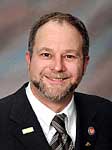
Ted Dealey got his newspaper the old-fashioned way: he inherited it. His father, George B. Dealey, founded the Dallas Morning News in 1885, seven years before Ted was born. In the 1920’s, when the Ku Klux Klan chose Dallas for its national headquarters, the Dallas Morning News, thanks in part to young Ted’s efforts, led a public campaign against the KKK. This included withstanding advertising boycotts and angry mobs gathering outside the paper’s headquarters. The paper eventually persuaded the leading businessmen of Dallas that it was bad for business for Dallas to be known as the KKK bulwark in America. The Klan moved its headquarters elsewhere.
The paper emerged stronger and more influential than ever. It had no rival as Texas’ leading newspaper. Until the 1950’s, the paper’s politics was squarely within mainstream America, endorsing Franklin Roosevelt and supporting his New Deal programs.
By 1961 Ted Dealey’s paper had abandoned all pretense of moderation – or anything hinting at its old support of the New Deal. It has become a publication of the most extreme fringe of the far right. One of its own reporters described the editorial page as “not just dissenting, but insulting.”
The practical effect was that The Morning News gave media cover to the kooks of Dallas.
U.N. Ambassador Adlai Stevenson’s speech at the Dallas Memorial Auditorium on October 24, 1963 started late. It was delayed by the fistfights that broke out between the people who had come to hear Stevenson and those who were there to heckle Stevenson. About 15 minutes after the speech was scheduled to begin, the Dallas police show up, break up the fights, and Stevenson takes the stage.
Frank McGehee (Founder of the “National Indignation Convention”) gets up and starts shouting, trying to interrupt Stevenson’s speech. A roar of approval erupts as the police march McGehee towards the exit. The remaining hecklers use Halloween noisemakers to try to interrupt the remainder of Stevenson’s speech. As Stevenson leaves the auditorium, he chats and shakes hands with supporters as he moves to his car. Suddenly, Cora Lacy Fredrickson, the wife of a Dallas insurance executive (and a staunch supporter of General Walker) runs toward Stevenson and hits him in the head with the sign she is carrying, barely missing Stevenson’s eye. Stevenson nearly reaches his car when two young men leap forward from the crowd and yell “traitor,” and spit in Stevenson’s face.
A Dallas television reporter was right behind Stevenson, filming the entire episode.
Millions of Americans are opening their morning newspapers to find shocking photos from Dallas, a city that seems to have gone insane.
Reporters summon references to 1960, when Vice Presidential candidate Lyndon Johnson and his wife visited Dallas.
Stevenson departs Dallas early Friday morning, having spent less than 24 hours there. “A dozen uniformed police officers and at least 6 plainclothesmen” stand guard as he makes the short walk from the airport terminal to his plane.
Later the same day, Stevenson takes a phone call from Arthur Schlesinger, a Senior White House Aide. Schlesinger tells him that Kennedy admires how he remained calm under fire in Dallas. Stevenson mentions that “there was something very ugly and frightening about the atmosphere.” He says that he had talked to some of the leading people in Dallas. “They wondered whether the President should go to Dallas,” he said, “and so do I.”
The Texas representative on the Democratic National Committee, Byron Skelton, also tries to persuade Bobby Kennedy that the President shouldn’t visit Dallas. Senator William J. Fulbright of Arkansas advised Kennedy that Dallas was dangerous. “I wouldn’t go there. You shouldn’t either.”
After the assassination of the President, not everyone mourned. Schoolchildren in Dallas cheered when they heard the news, according to a wire service report.
Given the reputation of Dallas in the context of 1963, is it any wonder that people who were old enough to be aware of current events at that time regard the official story of the Kennedy assassination skeptically?
Paul Schwietering is a former Democratic state central committeeman for the 14th state senate district.
